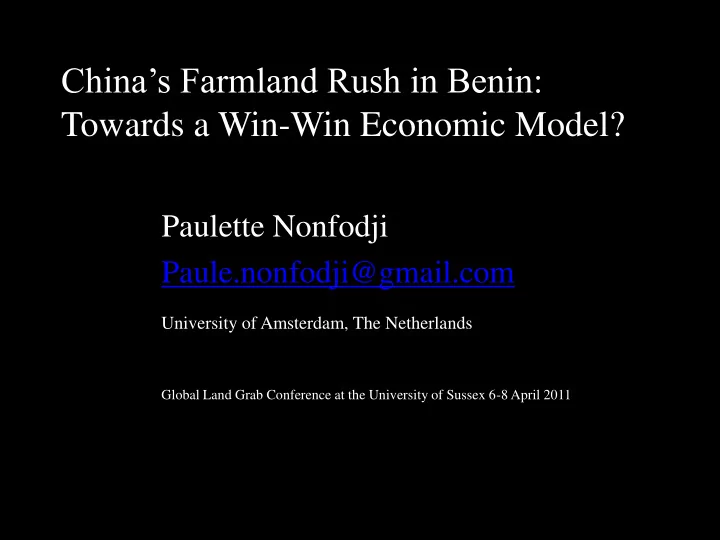

China’s Farmland Rush in Benin: Towards a Win-Win Economic Model? Paulette Nonfodji Paule.nonfodji@gmail.com University of Amsterdam, The Netherlands Global Land Grab Conference at the University of Sussex 6-8 April 2011
Methodological Issues Benin like China had been communist Research question To what extent does the Chinese state capitalism approach to the farmland rush in Benin constitute a win-win economic model and how does this approach differ from the neo-liberal one?
Benin’s agro -fuel programme Agro-fuel is the way to development and therefore the need for foreign investment makes land deals necessary Benin has of over 8 millions hectares of farmland of which 5% is needed for the national programme National and International Markets Expected Demand 2011 2015 2020 Ethanol (Millions 203 538 1150 Litres) Biodiesel (Millions 45 112 207 Litres) Total Needs in 90,605 243,445 471,795 Farmland (Hectares)
A Neo-Liberal Approach Colethanol: A Self-Sufficient Closed System for ethanol production: One plant for the production of electricity destined to provide in the power needs of the second plant entirely dedicated to producing 2,780,000 to 3,475,000 litres ethanol per year Cassava and sweet sorghum as feedstock for ethanol
A Neo-Liberal Approach Benin’s contribution to Colethanol closed system: Exemption from taxes and subsidies Lease for $0.05 per year of 100,000 hectares of farmland situated in the savannah in order to avoid EU and US’s embargo on ethanol produced by destroying the forest Why overburden the savannah and give desertification a chance?
Chinese State Capitalism Approach Complant International: A Joint Venture Company Construction for the production of ethanol Targeting sugar factories on the edge of bankruptcy Sugar factories often have vast farmland making part of them Ethanol produced on the basis of sugar cane complemented with cassava coming from local farmers
Chinese State Capitalism Approach Complant International: A Joint Venture Company Construction In Benin conversion of tenant management contract into land deal Combines Benin’s sugar factory SUCOBE with 3 others: Complant Magbass Sugar Complex Company Limited in Sierra Leone S ucrerie Cote Ouest de Complant de Madagascar Sucrerie de Complant de Madagascar both in Madagascar
Chinese State Capitalism Approach Benin’s contribution to the joint venture company construction by: Giving ownership of 4800 hectares for free as a part of the sugar factory initiative Exemption from import taxes Allowing wage discrimination between employees of Chinese origin and the local ones
Neo-Liberal Versus Chinese State Capitalism Approach Neo-Liberal Chinese State Capitalism Search for farmland in savannah which Sugar factories with their farmland are meets criteria of EU/US embargo on targeted Weakens EU/US’s embargo argument deforestation Replicable self-sufficient closed system Set up of joint venture company for agro-fuel production construction for ethanol production Lease of farmland Lease and ownership of farmland Exemption from taxes Exemption from import taxes Subsidies Wage discrimination based on origin
Chinese Approach: A Win-Win Economic Model? For Benin the agro-fuel programme would be a win-win situation if: Farmland owners are made full partners of every agro- fuel project The whole production chain including the finished product is situated in Benin Part of the produced agro-fuel is available for the national market Permanent jobs in rural areas are created as a part of the projects and as a result rural poverty will be reduced.
Chinese Approach: A Win-Win Economic Model? Complant International wants: To become for free owner of 4800 hectares of farmland. To Create no permanent jobs which are based on wage discrimination between employees of Chinese origin and the national ones To export all the production of ethanol and its derivatives
Chinese Approach: A Win-Win Economic Model? The win-win economic model Chinese Corporate suggests to Benin agro-fuel programme does not differ much from the neo-liberal approach It resorts to contractual and occasional rural jobs based on wage discrimination vis-à-vis non- Chinese local employees Corporate organizations remain the big winners of the land deals regardless whether they come from the East or the West.
THANK YOU ALL FOR YOUR ATTENTION
Recommend
More recommend